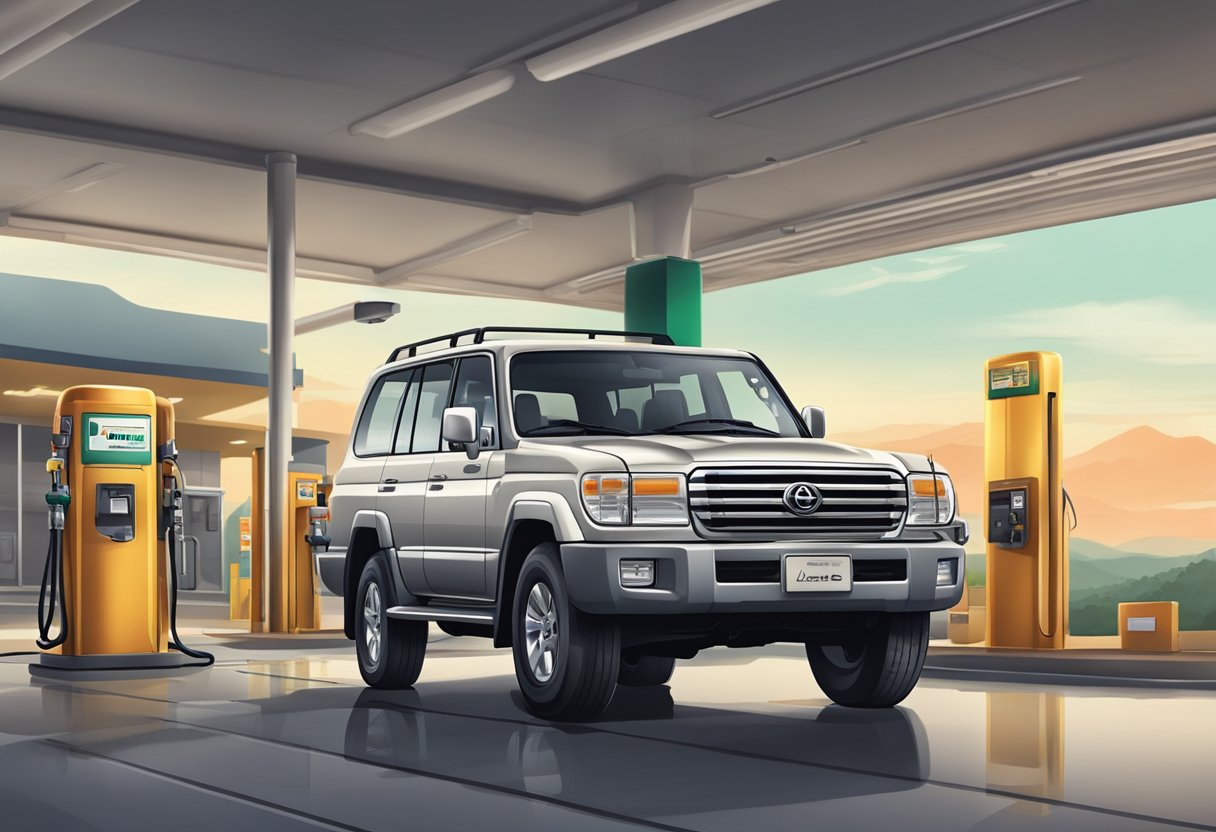*This post may contain affiliate links. As an Amazon Associate we earn from qualifying purchases.
When it comes to fuelling a Land Cruiser, the question arises: premium gas is a must, or can owners get by on regular unleaded? It’s a topic that not only fuels car forums with endless debate but also has practical implications for your wallet and potentially, your vehicle’s longevity. Certain models of the Land Cruiser line, particularly those with high-performance engines like the Lexus LX570, explicitly state the need for premium fuel. On the other hand, some Land Cruiser owners report using regular unleaded with no apparent issues, igniting a conversation as heated as the combustion taking place in their engines.

The heart of the matter lies within the engine bay, where the precision of Toyota engineering meets the raw realities of the road. The engines equipped in Land Cruisers are designed with certain performance specifications in mind. Premium gas, with its higher octane rating, is said to prevent engine knock—a symphony no car enthusiast wants to hear—but is it the only way to keep the performance up and the knocking down? Some adventurous souls may flirt with the danger of lower octane fuels, while others stick to the book, ensuring their muscular machines get only the finest sips of petroleum.
Key Takeaways
- Premium gas may be required for some Land Cruiser models, especially those with high-performance engines.
- Using regular unleaded fuel in Land Cruisers designed for premium can spark debate on engine performance and vehicle maintenance.
- The engine’s requirements and the choice of fuel used can affect the vehicle’s performance and potentially its longevity.
The Great Octane Debate: Premium or Regular for Your Land Cruiser?
https://www.youtube.com/watch?v=fD169YXFVdg&embed=true
Navigating the world of octane ratings can leave you feeling like you need a chemistry degree. Let’s break down the fuel facts, minus the jargon, and see what’s best for your mighty Land Cruiser.
What’s the Fuss About Octane?
Octane rating is, simply put, the measure of fuel’s resistance to knock – the premature combustion of the fuel-air mix in the engine. Higher octane equals less knock, and less knock equals a smoother ride in theory. Premium gas typically starts at 91 octane, while regular unleaded gas hovers at the 87-mark.
The Land Cruiser’s Thirst: Premium Gas Versus Regular
Toyota Land Cruisers, especially the lusher V8 models, exhibit a prestigious thirst for high octane. But there’s a twist: some riders in the forum kingdoms muse that their Land Cruisers guzzle regular gas without so much as a hiccup, contrary to the wisdom of the owner’s manual.
Manual Seduction: Reading Your Land Cruiser’s Needs
The owner’s manual of the Lexus LX, a close relative of the Toyota Land Cruiser, insists on premium gas. But the manuals for some Land Cruiser models play it cool, suggesting that 87 octane can still float the boat.
The Cost of Being Classy: Gas Prices and the Land Cruiser Lifestyle
Premium Gas:
- Higher cost per gallon
- Potential for improved engine performance and gas mileage
Regular Gas:
- Lighter on the wallet per gallon
- Purportedly less beneficial for performance and efficiency
The wallet’s cry is real. Premium can take more of your treasure, but promises added perks in performance and miles per gallon like a genie’s bargain. Regular, on the other hand, keeps your gold stash healthy but may keep your Land Cruiser from feeling sprightly.
Trick or Torque: The Performance Enigma of High Octane
It’s the showdown of the century: can high octane fuel truly bestow extra torque and horsepower, turning your Land Cruiser into an asphalt-thumping stallion? Or is it just a high society myth? Bench tests scream “Yes!” while pragmatic pumpers claim it’s all sizzle and no steak.
| Octane level | Horsepower | Torque | Gas Mileage | Cost |
|---|---|---|---|---|
| Premium | May increase | Could be higher | Might improve | More doubloons |
| Regular | Adequate | Sufficient | Possibly less | Saves shillings |
As the octane debate rages on, it seems the jury’s still out. Perhaps the Land Cruiser gods will one day grant us a clearer sign, but until then, it’s a choose-your-own-adventure on the fuel frontier.
The Techie Talk: Engines, ECU, and Knock-Knock Jokes

In the grand scheme of things, the relationship between a Land Cruiser’s V8 engine and its preferred juice—premium gas—is much like a refined comedian; quite specific about the quality of the setup to deliver the perfect punchline.
The Heart of the Beast: V8 Engine and Its Dietary Preferences
Toyota Land Cruiser’s V8 engine might have a reputation harder to crack than a walnut in a vice. But when it comes to fuel, this heart of the beast isn’t picky out of spite—there’s science in the sauce. Higher octane rating fuels are like gourmet food for this mighty motor, helping it avoid the hiccups known as engine knock.
- Regular Gas: Might cause a stir, hinting at potential knock.
- Premium Gas: The V8’s preferred platter, promoting smooth performance.
The difference isn’t just about taste; higher octane means higher resistance to early combustion, keeping the engine’s rhythm as smooth as a jazz solo.
Timing Is Everything: How Your Land Cruiser Responds to Fuel
The ECU, or the engine’s brain-box, is a maestro at maintaining a harmonious engine performance. Let’s face it, the timing is everything—ask any comedian or your Land Cruiser.
Here’s how timing plays out with different fuels:
- Regular Fuel: ECU retunes the rhythm, delaying the timing to prevent knock.
- Premium Fuel: ECU optimizes timing for performance, allowing you to fully harness the V8’s gusto.
In this delicate dance of detonation and timing, the ECU ensures every combustion cycle is a standing ovation.
Knock-Knock! Who’s There? Detonation Issues in Engines
Nobody likes a bad knock-knock joke, especially not the V8 engine. Detonation—or pre-ignition—is the unwanted punchline that no engine wants to hear. It’s when the fuel mixture in the cylinders goes off-script and combusts out of turn.
Detonation Scorecard for the Unwelcome Guests:
- Low Octane Fuel: More knocks at the door.
- Correct Octane Fuel: Silence is golden, no knocks.
In the comedic world of engines, the knock sensor acts like a bouncer, signaling the ECU to tweak the ignition timing and keep the performance knock-free. It’s this smart tech that helps maintain the Land Cruiser’s engine longevity with the right octane fuel.
Beyond Gasoline: Diesel and Towing Capabilities
https://www.youtube.com/watch?v=MXlKLKpA-fQ&embed=true
Before unleashing the might of diesel and hooking up a trailer, it’s critical for a Toyota Land Cruiser enthusiast to understand the interplay of diesel fuel with their robust towing capabilities.
Diesel Dynamics: The Other Fuel Frontier
They say diesel runs in the veins of the most capable off-roaders. When it comes to the Toyota Land Cruiser, going diesel is like choosing a double espresso over decaf. It’s all about the torque. Diesel engines are notorious for their robust pulling power, making them perfect companions for adventurous souls and heavy lifters alike. For those who want to extract every ounce of performance, such a vehicle is more than a ride; it’s their loyal beast of burden.
- Diesel: It’s not just for trucks, folks.
- Torque: That thing diesel has more of, it’s like muscle for your vehicle.
- Performance: Diesel makes the Land Cruiser go “vroom” with more gusto.
Towing the Line: Land Cruiser, Towing Capacity, and Fuel Type
When Land Cruiser owners aren’t busy conquering rugged terrain, they might be found pulling everything from boats to horse trailers. Thanks to its muscular torque output, a diesel Land Cruiser doesn’t just tow; it flexes its horsepower like a weightlifter at a beach party. Selecting the right fuel type is crucial to maximize the towing prowess without turning your wallet into yet another casualty.
| Feature | Benefit |
|---|---|
| Diesel Fuel | Higher energy density, more power per gallon |
| Towing Capacity | Ability to haul heftier loads with ease |
Remember, a diesel Land Cruiser doesn’t shy away from heavy lifting; it hooks up to a trailer and says, “Let’s dance.”
